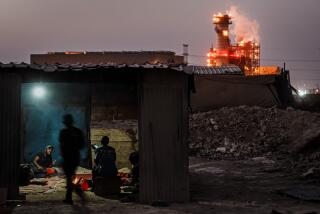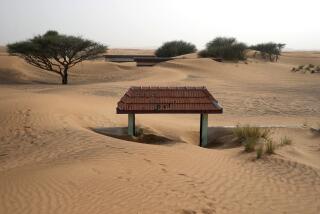Egypt Is Restoring Tradition at Sinai’s Aasala Beach After 15 Freewheeling Years
- Share via
AASALA, Egypt — As Bedouin Arabs pass with their camels, a foreign woman sunbathes on the beach in a bikini, barely conforming to the edict posted at the nearby police station: “No Nakedness.”
Egypt is trying slowly to restore the strict traditional ways that gave way at this Sinai Peninsula beach on the Gulf of Aqaba during 15 years of Israeli occupation.
During the Israeli years, topless bathing was permitted, and a lot else went on.
The Israelis took the Sinai Peninsula in the 1967 Arab-Israeli War. And because Aasala is just 75 miles southwest of the Israeli port of Eilat, its undisturbed beaches and coral reefs became a popular resort.
Favorite Hangout
Thus, by the time Israel returned the peninsula to Egypt in 1982, Aasala had become a favorite hangout for young Europeans, Americans and Israelis.
They came to this three-mile stretch of tiny bays, rocky coves and clear blue waters to enjoy scuba diving and snorkeling on some of the world’s best coral reefs, sunbathing and cheap food and lodging.
They still are coming to rent a thatch hut for the equivalent of 50 cents a night or a bare stone cabin for $1 to $1.50 a night.
The Bedouin-run restaurants still offer seafood, omelets, sandwiches, coffee, hot chocolate and soft drinks. But they no longer have permits to serve alcohol, as they did in Israeli times.
Free-Wheeling Center
During the occupation, Israel’s relatively liberal social attitudes and the tolerant traditions of local Bedouins made Aasala a freewheeling recreation center. That made it an anomaly in a country where Islamic values--including female modesty, sexual segregation and abstention from alcohol--are widely observed.
At other beaches, Egyptian women in ankle-length dresses and covered heads wade along the shore or sit under umbrellas as their menfolk and children swim.
Until this spring, topless bathers were seen often on the beaches at Aasala. Drugs and alcohol were widespread.
But the Egyptian government now is enforcing a ban on topless bathing. It also has imposed a 10 p.m.-to-dawn curfew and prohibited Egyptians from spending nights here.
Harassment Claimed
Cafe owners, however, claim that the crackdown was triggered by incidents in which Egyptian men, high on drugs and provoked by the sight of topless women, sexually harassed foreigners.
Nevertheless, Aasala’s bikini-clad sunbathers and loudspeakers blaring Bruce Springsteen’s “Born in the USA” still form a far different picture from many other beaches on the Sinai.
Awad Mohammed, an Egyptian bus driver, said he still doesn’t like the way things are at Aasala.
“What goes on in these camps is bad for Egypt’s reputation,” he said. “There’s total freedom there--drugs and alcohol.”
Foreigners Blamed
Mohammed echoed the opinion held by many in the area that foreigners are to blame.
Although they are Egyptian nationals, the Bedouins tend to take a relaxed view. They also do most of the business at Aasala.
“The Bedouin here are cool,” said Moses Ahmed, an American of Egyptian extraction and an habitue of Aasala. “They’re peaceful and good business people. . . . They respect other people’s traditions. Nothing shocks the Bedouin.”
Many local Bedouins speak Hebrew, learned during the occupation, and now are picking up German because of an increasing influx of young backpackers from West Germany.
Pay in Advance
Visitors checking in at Sheik Aly’s stone cabins or Sheik Mahmoud’s thatch huts bring their own sleeping bags and amenities.
More to Read
Sign up for Essential California
The most important California stories and recommendations in your inbox every morning.
You may occasionally receive promotional content from the Los Angeles Times.










